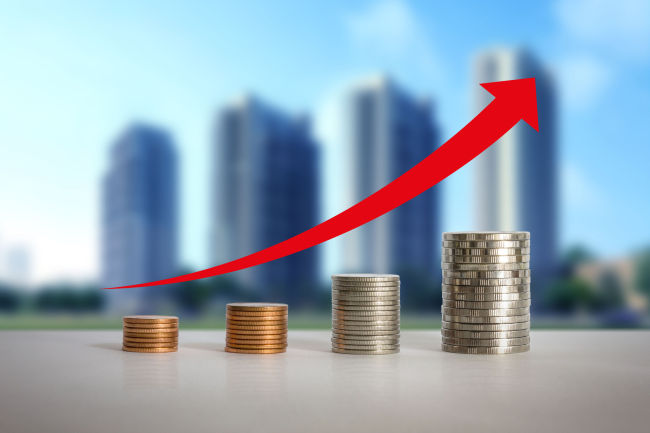Concerns are growing that a steep rise in corporate costs to be incurred by the Moon Jae-in administration’s anti-business policies will hold back companies from increasing investment and employment.
Korean businesses are now bracing for a corporate tax hike, a minimum wage increase and a reduction in work hours in the coming year, which experts forecast will see them shoulder combined additional costs of 36.5 trillion won ($33.4 billion).
Ruling party lawmakers, joined by some legislators from splinter opposition parties, voted early this month to approve a government-proposed tax code revision.
The amendment calls for, among other things, raising the maximum corporate tax rate to 25 percent from the current 22 percent.
The Ministry of Strategy and Finance says the maximum rate will be applied to the 77 companies here with taxable profits of more than 300 billion won, which combined will pay 2.3 trillion won more in taxes next year.
A planned minimum wage hike by 16.4 percent from this year to 7,530 won in 2018 is estimated to increase wage costs by up to 21.9 trillion won, according to the Korea Federation of Small and Medium-sized Enterprises.
If the maximum workweek is reduced to 52 hours from the current 68 hours as envisioned by a draft revision to the labor act, companies are expected to pay 12.3 trillion won more in wages. More than two-thirds of the sum will be shouldered by SMEs with less than 300 employees, showed a study by the Korea Economic Research Institute, a private think tank.
Local businesses may pay a lot more in wages and other benefits if they are pressured into turning hundreds of thousands of temporary jobs into permanent ones.
Cho Kyung-yup, a KERI researcher, said an increase in corporate costs across all industrial sectors could result in offsetting the effect of the income-led growth policy pushed by the Moon administration.
“More jobs might be lost amid the weakening of corporate competitiveness,” he said.
Since it was launched in May, the Moon administration has prioritized creating more jobs to propel its income-led growth drive.
But the on-year increase in the number of employees has continued to slow down in recent months, with the youth unemployment rate reaching 9.2 percent in November, the highest level for the month in nearly two decades, according to official data released Wednesday.
Experts say the Moon administration’s push to boost employment by creating more public-sector jobs is financially unviable, noting encouraging corporate activity as the most effective way to settle the unemployment problem.
“What the government has done so far is to make the business environment worse, discouraging companies from making new investments,” said a corporate executive, asking not to be named.
“Increased burdens will result in further hurting the global competitiveness of Korean companies,” he said.
Changes in Korea’s tax code comes at a time when other major economies are competing to lower corporate tax rates to spur growth.
Early this month, the US Senate passed a bill to cut the maximum corporate tax rate from 35 percent to 20 percent, which could save American companies up to $1.5 trillion in levies over the coming decade.
Japan is pushing to slash its effective corporate tax rate, currently at 29.97 percent, to as low as 20 percent for firms raising wages and investing in innovative technologies such as artificial intelligence and the Internet of Things.
The UK and France are planning to reduce corporate tax rates from 19 percent and 33.3 percent to 17 percent and 25 percent, respectively, in the coming years.
The average corporate tax rate of member states of the Organization for Economic Cooperation and Development was down from 30.2 percent in 2000 to 22.5 percent last year. Over the past year, only two OECD members — Chile and Slovenia — raised the rate.
Korea’s backpedaling on the taxation of corporate profits, coupled with other measures to balloon corporate costs, is expected to further drive local companies to move production and increase investment abroad.
Over the past decade, overseas investments by Korean firms have tripled foreign investments in the country, according to the Ministry of Trade, Industry and Energy.
Government officials say only a fraction of companies will be subject to the corporate tax hike. But the 77 companies affected by the measure accounted for nearly half of corporate levies collected last year.
The revised tax code will also reduce tax deductions from 30 percent to 25 percent on corporate investments in new research and development projects.
According to the 2017 EU Industrial R&D Investment Scoreboard released this week, only 10 Korean companies were on the list of 2,500 global firms that have made the largest research and development investments in the year. The number was down from 80 in 2015 and 75 in 2016.
The Moon administration has dragged its feet on regulatory and labor reforms, which are needed to boost corporate investment and the country’s long-term growth.
The aggravating conditions faced by Korean businesses are in sharp contrast to consistent and persistent efforts by Japanese Prime Minister Shinzo Abe’s government to encourage corporate activity through fiscal expansion, monetary easing and drastic deregulation.
Japan’s unemployment rate remained at 2.8 percent in October, the lowest in 23 years.
The depreciation of the Japanese yen prompted by Abe’s stimulus policy is hurting the price competitiveness of Korean manufacturers vying with Japanese rivals in overlapping markets abroad. The value of the yen has fallen nearly 8 percent against the Korean won over the past three months.
A study by the Hyundai Research Institute, a private think tank, showed a 10 percent appreciation of the won against the yen would result in reducing exports by 13.8 percent in petrochemicals, 11.4 percent in steel, 7.9 percent in machinery, 7.6 percent in autos and 6.9 percent in home appliances.
By Kim Kyung-ho ([email protected])


